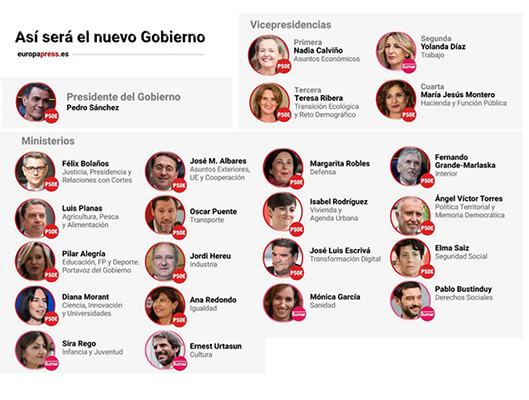Fernando González Urbaneja | Pedro Sánchez’s new government follows the model of the previous one: on the one hand a coalition government with five portfolios from the minority group and 17 under the discipline of the president, including four described as independents, although very close to the PSOE and Sánchez. The 22 members of the cabinet belong to six parties (PSOE, PSC, Sumar, Comunes, Izquierda Unida and Más País). But all of them are loyal to the president, as could not be otherwise. It is a government of continuity with respect to the previous one, although with nine new faces and as many changes in the composition of the ministries that will require a process of landing and adjustment that will take several months. So a new-old government.
The architecture of the cabinet maintains the traditional structure of a government with several top-level ministries to which new competencies are annexed: Economy, Foreign Affairs, Interior, Defence, Finance, Labour, Ecological Transition, and Agriculture remain in their traditional structure, with the only novelty being that the head of Finance attains the rank of vice-president. The novelty is that the Presidency is joined by Justice and Relations with the Cortes (three in one), which responds to the extraordinary power of Félix Bolaños, who has become a political super-minister and the president’s right-hand man, without the rank of nominal vice-president, but with the powers of an effective first vice-president.
Downstream, the intertwining of competences between one ministry and another is the most frequent occurrence, with the inevitable bewilderment of civil servants and offices until the new organisation is integrated. Health remains the same, with few competencies and functions. A new Ministry of Youth and Children appears, separated from Social Affairs, which is compensated by Consumer Affairs; Equality is maintained, although with a change in the entire leadership group, which is now under socialist discipline as opposed to the former “podemita”, which loses all its power after being evicted from this ministry and from the government itself. Sports is detached from Culture (ceded to Sumar) to remain in socialist hands, integrated into Education. The old Ministry of Public Works, which has undergone several nominations over the years, is split into a Ministry of Transport and a Ministry of Housing, to which two ministers with no prior knowledge of the subject have been appointed. It will take them a few months to learn the subject, or perhaps they will move on without ever understanding it.
Two ministries of a technical nature change hands, and it is advisable to arrive at them with a good knowledge of the subject: Industry and Tourism, and Social Security and Immigration. The former is to be headed by a person with a PSC quota and a profile suited to employment, albeit distant from it. For Social Security, a person arrives who is unfamiliar with the subject and who will have to get up to speed with the complexity of the matter.
An unknown quantity is the task entrusted to José Luis Escrivá, separated from Economy, and about which there is nothing described, as on the one hand it sounds like a waiting period while the fate of Vice-President Calviño is resolved, and on the other it sounds like nothing at all. Social Affairs loses a person who knows the matter (Nacho Álvarez) due to the capricious tensions of Podemos, to be entrusted to a young politician with no experience in the matter who will also take a few months to find out about it.
Education, Science and Universities are left in the hands of two ministers who have nothing to do with these subjects, both of whom are in the same cabinet with renewed competences that will require a few months of landing.
In short, a new-old government typical of Sanchezism with many components, all of them replaceable as the legislature evolves. The fundamental task of the government is written in the investiture pacts that go through the old ministers and fundamentally through the president.
In the end, the Gospel maxim from Matthew’s Gospel is useful: Jesus said in the Sermon on the Mount: “By their deeds you will know them”.





